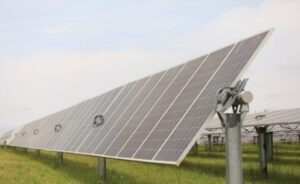Last week Dominion Energy announced a slew of new solar and energy-storage projects, which it describes as a “significant step” toward achieving the net-zero carbon goals for Virginia’s electric grid under the Virginia Clean Energy Act.
The proposed investments include 11 utility-scale projects, two small-scale distributed solar projects, one combined solar and energy-storage project, and one stand-alone energy storage project. Aside from receiving State Corporation Commission approval, the projects will require state environmental permits and local zoning approval.
Once in operation, the projects will be able to provide 1,000 megawatts of electricity, or roughly enough to power 250,000 homes at peak output. Dominion said the package of projects would add $1.13 to the typical residential customer’s monthly bill.
Dominion’s announcement raises questions. If utility-scale solar is the most economical form of electricity generation, how come rates will be going up?
Part of the answer hinges on the words highlighted above, “at peak output.” Solar generates the cheapest electricity on the planet — when the sun is shining. But the sun sets with fair regularity — at least it has for the past four billion years — and sometimes these things called clouds block the sun’s rays. Therefore, Dominion must maintain electric generating capacity to provide electricity when the sun isn’t shining.
What’s interesting in this proposed package is that Dominion will acquire some electric-storage backup. Dominion is dipping its toe into battery storage. It appears to be adopting the same strategy as it did with its earliest, small-scale solar projects of setting up pilot plants to see how they integrate into the electric grid.
In this package, Dominion wants to set up a combined solar/battery storage project and a stand-alone battery storage project. The Dry Bridge Storage project in Chesterfield County will generate up to 20 megawatts, while the Dulles Solar and Storage project in Loudoun County will generate 100 megawatts of solar and provide 50 of storage.
The announcement does not break out the cost of the battery storage. But solar + battery storage gives us a truer cost to the electric system, which must create redundancy in order to maintain reliability, than calculating the stand-alone cost per kilowatt at the solar-panel level. Hopefully, the SCC will hold hearings that allow the public to gain keener insight into the economic of solar, battery storage and the full system costs of solar.


Leave a Reply
You must be logged in to post a comment.